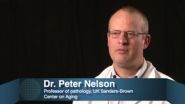(Press-News.org) Prostate cancer patients carrying inherited mutations in the BRCA genes respond less well to conventional treatment, including surgery and/or radiotherapy - and they also have a lower survival rate than those who are non-carriers of these genetic mutations. Data from the study, which has been published in the journal European Urology, points to the need for new clinical trials aimed at targeting these mutations in order to tailor treatment for these patients.
The study has been led by David Olmos and Elena Castro at the Spanish National Cancer Research Centre (CNIO) and Rosalind Eeles at the Institute of Cancer Research & Royal Marsden NHS Foundation Trust in the UK.
10-YEAR SURVIVAL REDUCED BY HALF
The findings originate from a 2013 study published by the same group of researchers in which they observed that patients carrying inherited mutations in the BRCA genes suffered from more aggressive tumours and died earlier. "That was when we found the first genetic factor associated with prostate cancer prognosis," explains Castro (for further information: http://www.cnio.es/es/news/docs/david-olmos-journal-clinical-oncology-9abr13-en.pdf)
It was then that the researchers decided to conduct a more in-depth study of patients with inherited BRCA mutations and the treatments applied to them, radiotherapy or surgery. According to the article, the results are unambiguous: regardless of the treatment received, patients with tumours at a localised stage (that is, non-metastatic tumours) do not respond as well to the current treatments as patients not carrying the mutations.
Over 1,300 patients participated in the study, 67 of whom were carriers of BRCA mutations. Patients carrying such mutations who had undergone radiotherapy showed 10-year survival rates of 39%, compared to 80% for non-carriers. Amongst patients who have undergone surgery the difference in 10-year survival rates is less pronounced (91% vs. 67%; see table); the smaller difference in survival rates among carriers and non-carriers who have undergone surgery shows that "these patients may require more long-term monitoring to establish whether or not this difference is significant," argues Castro.
CHANGE OF TREATMENT STRATEGY FOR THESE PATIENTS
Still to this day, the prognostic factors that would help determine a more personalised treatment are unknown. Smaller, less aggressive tumours are surgically removed; larger and/or more aggressive tumours are treated using surgery and radiation therapy. "An important issue is that during consultation we usually cannot predict which patients will evolve less favourably and which will live less time than others," the researcher explains. The team's objective is to identify the subgroup of patients with the least favourable prognosis and the treatments that best match their genetic characteristics.
BRCA genes produce proteins that block tumour development, thereby guaranteeing the stability of the genetic material in cells; when the DNA gets damaged by environmental, hereditary or other factors, BRCA proteins come into play to fix it and therefore guarantee the survival of the cells. Specific mutations in these genes prevent damaged cells from repairing the DNA efficiently and have been associated with various types of cancer, including breast, ovarian and prostate cancer.
PARP inhibitors are used as tools for specifically targeting the destruction of tumour cells with BRCA mutations. These molecules, which are currently in clinical trials for the treatment of prostate cancer, are proving to be very effective in the treatment of breast and ovarian cancer when there are BRCA mutations. Furthermore, "prostate tumours with sporadic mutations [present only in the tumour, not inherited] in BRCA, also respond to these inhibitors, according to recent data presented during the ESMO [European Society for European Oncology] congress in Madrid," states Olmos.
The conclusions of this study underline the importance of launching clinical trials designed to assess new treatment strategies and the therapeutic potential of novel drugs for prostate cancer in these patients, such as PARP inhibitors.
CLOSER MONITORING
This study has focused on prostate cancer patients with hereditary BRCA mutations. "We are investigating whether patients with sporadic mutations in these genes also show more aggressive and metastatic tumours, and whether or not they respond less well to conventional treatments than patients not carrying BRCA mutations."
If this hypothesis is confirmed "there would be a need for closer monitoring of patients with BRCA mutations, regardless of the origin [hereditary or sporadic], in order to improve the clinical course of these patients."
Prostate cancer is the second most common form of cancer affecting men in the world - and the most common in some countries, including Spain, where 25,000 new cases are diagnosed every year. It is believed that 2% of these patients are carriers of hereditary BRCA mutations, while 12% of the patients have sporadic mutations in the same genes.
The relevance of this work and its implications for the improved care of prostate cancer patients were recognised last year at the Genitourinary Cancers Symposium organised by the American Society of Clinical Oncology (ASCO), which awarded the preliminary research work a Merit Award.
INFORMATION:
The study has been financed by the Ronald and Rita McAulay Foundation, the CRIS Foundation for Cancer Research, the Spanish Association against Cancer (AECC), the GAME-ON initiative, and the European Union.
Reference article:
Effect of BRCA mutations on metatastatic relapse and cause-specific survival after radical treatment for localized prostate cancer. Elena Castro, Chee Goh, Daniel Leongamornlert, Ed Saunders, Malgorzata Tymrakiewicz, Tokhir Dadaev, Koveela Govindasami, Michelle Guy, Steve Ellis, Debra Frost, Elizabeth Bancroft, Trevor Cole , Marc Tischkowitz, M. John Kennedy, Jacqueline Eason, Carole Brewer, D. Gareth Evans, Rosemarie Davidson, Diana Eccles, Mary E. Porteous, Fiona Douglas, Julian Adlard, Alan Donaldson, Antonis C. Antoniou, Zsofia Kote-Jarai, Douglas F. Easton, David Olmos, Rosalind Eeles. European Urology (2014). doi: 10.1016/j.eururo.2014.10.022
The expression of SIP1 protein in pharyngeal squamous cell carcinoma tumours often indicates an advanced tumour stage, a high risk of recurrence and a poor prognosis, according to research from the University of Eastern Finland. Based on the results, SIP1 is a potential new prognostic factor for clinical use, helping to single out patients with more aggressive tumour behaviour requiring more intensive therapy and closer follow-up. Ms Anna Jouppila-Mättö, MD, presented the results in her doctoral thesis.
Although pharyngeal squamous cell carcinoma (PSCC) is a ...
PROVIDENCE, R.I. [Brown University] -- A new study documents the stark health dangers of the male sex trade in the streets, hotels, and discotheques of Mexico City. Lead author and health economist Omar Galárraga's point in making the grim assessment of the legal but perilous market is to find an incentive that might reduce the spread of HIV and other diseases in the nation's community of men who have sex with men.
"It's a very highly at-risk population," said Galárraga, assistant professor of health services, policy and practice in the Brown University School ...
Since the 1850's scientists have known that crystalline materials are organized into fourteen different basic lattice structures. However, a team of researchers from Vanderbilt University and Oak Ridge National Laboratory (ORNL) now reports that it has discovered an entirely new form of crystalline order that simultaneously exhibits both crystal and polycrystalline properties, which they describe as "interlaced crystals."
Writing in the Nov. 14 issue of the journal Nature Communications, the researchers describe finding this unusual arrangement of atoms while studying ...
A team of Cardiff University researchers have made a breakthrough in helping scientists discover hundreds of black holes throughout the universe.
When two detectors are switched on in the US next year, the Cardiff team hope their research will help scientists pick up the faint ripples of black hole collisions millions of years ago, known as gravitational waves.
Black holes cannot be seen, but scientists hope the revamped detectors - which act like giant microphones - will find remnants of black hole collisions.
Led by Dr Mark Hannam from the School of Physics and Astronomy, ...
(PHILADELPHIA) - Although radiation treatments have become much more refined in recent years, it remains a challenge to both sufficiently dose the tumor while sparing the surrounding tissue. A new anti-cancer drug, already in clinical development, may help address this issue by protecting normal cells - but not the cancer - from the effects of radiation. The research, published November 14th in Molecular Cancer Therapeutics, further suggests this drug may also be useful in treating accidental exposure to radiation.
"It was a stroke of luck that the drug that most effectively ...
Nonsmokers sitting in an automobile with a smoker for one hour had markers of significantly increased levels of carcinogens and other toxins in their urine, indicating that secondhand smoke in motor vehicles poses a potentially major health risk according to a groundbreaking study led by UC San Francisco researchers.
The nonsmoking passengers showed elevated levels of butadiene, acrylonitrile, benzene, methylating agents and ethylene oxide. This group of toxic chemicals is "thought to be the most important among the thousands in tobacco smoke that cause smoking-related ...
Cancer Research UK scientists have found more than 400 'blind spots' in DNA which could hide cancer-causing gene faults, according to research published* today (Friday) in Cancer Research.
The researchers found hidden faults in areas that are tricky for gene-reading technology to decode. This technique, which unravels cancer's genetic blueprint, is an important part of the research that scientists carry out to understand more about cancer's biology.
By finding new ways to unlock these blind spots in the future, the researchers hope this will help us understand these ...
"This summer has seen the highest global mean sea surface temperatures ever recorded since their systematic measuring started. Temperatures even exceed those of the record-breaking 1998 El Niño year," says Axel Timmermann, climate scientist and professor, studying variability of the global climate system at the International Pacific Research Center, University of Hawaii at Manoa.
From 2000-2013 the global ocean surface temperature rise paused, in spite of increasing greenhouse gas concentrations. This period, referred to as the Global Warming Hiatus, raised a lot ...
What makes some women more susceptible to heart disease than others?
To help answer that question, researchers at Western University's Robarts Research Institute have identified that an estrogen receptor, previously shown to regulate blood pressure in women, also plays an important role in regulating low-density lipoprotein (LDL) cholesterol levels. LDL, also known as bad cholesterol, drives the process that leads to heart disease.
This finding provides evidence that the hormone estrogen plays a key role in regulating two of the most common risk factors for heart disease ...
VIDEO:
A multi-institutional study has defined and established criteria for a new neurological disease closely resembling Alzheimer's disease called primary age-related tauopathy (PART). Patients with PART develop cognitive impairment that can...
Click here for more information.
LEXINGTON, Ky (Nov. 13, 2014) -- A multi-institutional study has defined and established criteria for a new neurological disease closely resembling Alzheimer's disease called primary age-related tauopathy ...





